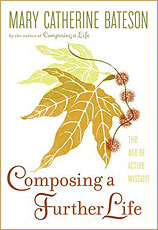"Part of the challenge, then, in growing older, is to discover the ways, arising from a lifetime of experience and in spite of reduced strength and stamina, in which it continues to be possible to contribute. The corresponding challenge to society is to recognize that contribution and to benefit from it instead of dismissing it. As we look for patterns of reciprocity at different stages of life, it may be important to consider every human activity and see the completed circuits of exchange rather than seeing benefits moving only in one direction. What does the physician gain from her patients besides fees? What does the teacher learn from his pupils? How does the comedian feed on laughter and the artist on recognition, and how does the politician rely on the trust and enthusiasm of supporters?
"Through questions like these we can discover the reciprocities in the emerging shape of lives as we gradually become a four-generation society — a society in which great-grandparents are as common as grandparents were in the past and possibly more so. We may find that longevity contributes as much to our humanity as has the extension of childhood. In the meantime, however, the fear of becoming useless and dependent erodes the spirit as definitions are turned into fact, for the most toxic aspect of aging is the negative beliefs that seniors may come to have about themselves and about each other.
"Aging today has become an improvisational art form calling for imagination and willingness to learn. Increased longevity will challenge us not only to revise expectations but also to discover unexpected possibilities, arranging life in new and satisfying patterns, and to explore how newly perceived possibilities relate to earlier life choices. In the process we will encounter gradual — or sometimes sudden — shifts of consciousness and identity that accompany awareness of the new situation.
"When do you move from Adulthood I to Adulthood II? When you reflect that you have done much of what you hoped to do in life but it is not too late to do something more or different. The doorway to this new stage of life is not filing for Social Security but thinking differently and continuing to learn. Adulthood II is characterized by the wisdom culled from long lives and rich experience, the most acceptable and positive trait associated with longevity, but combines it with energy and commitment in the context of a new freedom from some kinds of day-to-day responsibility, a freedom that challenges expectations and may even be frightening. Together these produce the active wisdom that older adults have to offer, which gives them the potential for altering the shape of public and family life in America."
